Methodology
In order to conduct a study and investigate the research problem, it was necessary to collect information from respondents. However, before gathering answers, it was important to obtain demographic data of each participant to ensure the validity of results later. The demographic characteristics of the sample employed for the present study are reflected in Table 1. The table contains data on participants’ origin, age, area of living, the level of education, and income.
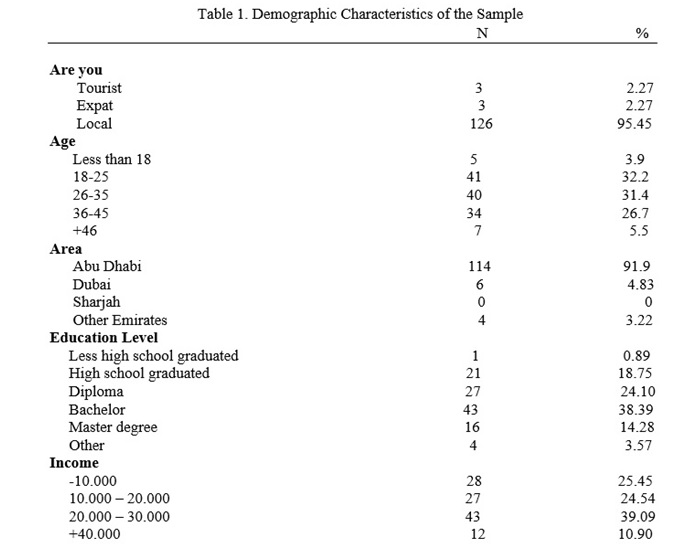
The primary aim of gathering data was obtaining the responses of individuals aged 18 and older to understand their beliefs and assumptions about hunger in Abu Dhabi. It is necessary to note that some participants did not answer some of the questions, so the number for each component of the table is slightly different. Overall, 132 people participated in the survey: 126 were locals (95.45%), three were tourists (2.27%), and three (2.27) were expatriates. The next question, which was rather important for researchers, asked about the prospective participants’ age. Five people (3.9%) reported to be younger than 18, 41 people (32.2%) was aged between 18 and 25, 40 individuals (31.4%) were aged from 26 to 35. Thirty-four respondents (26.7%) were aged between 36 and 45, and seven people (5.5%) were 46 and older.
The next factor in which researchers were interested was the origin of the prospective participants. Out of the general number of respondents, the majority – 114 – were Abu Dhabi citizens, which made 91.9%. Six people (4.83%) were from Dubai, four (3.22%) were from other emirates, and no one reported coming from Sharjah. Unlike the place of living, where the majority of individuals belonged to the same group, the education level was diversified. One person (0.89%) reported having less than high school education. Meanwhile, 21 individuals (18.75%) graduated from high school, and 27 (24.10%) had a diploma. As many as 43 participants (38.39%) had a bachelor’s degree, and 16 of them (14.28%) had a master’s degree. Finally, four people (3.57%) reported ‘other’ to be their education level.
The last category in the demographic table was the sample’s income. The majority of respondents reported earning AED20,000-30,000 monthly: 43 people (39.09%). Nearly the same number of people earned less than 10,000 and between 10,000 and 20,000: 28 individuals (25.45%) belonged to the first category, and 27 (24.54%) to the second. A considerably small number of people – 12 (10.90%) reported that their monthly income was higher than 40,000.
The collected data were quite useful since they allowed obtaining a reliable sample of participants who were older than 18, had high school, college, or university education, and lived in Abu Dhabi. Different levels of income were necessary to identify the attitude of different people to the problems of hunger and food waste. The data were collected via the Internet with the use of social networks and local websites. All prospective participants were requested to sign an informed consent form before starting the survey. Individuals had two weeks to complete the survey and send it to researchers. The survey consisted of three parts: the demographic data collection, a section of questions with several options to choose as answers, and an open-ended question. The survey was developed to learn whether people over 18 living in Abu Dhabi are satisfied with their lifestyle and whether they believe that there is a problem of hunger in Abu Dhabi.
The study poses several hypotheses to be confirmed or rejected based on results:
- People with a lower income are more likely to believe that the problem of hunger exists.
- People under 25 are less aware of social and economic issues than more mature individuals.
- Citizens of Abu Dhabi will support the needy even if they do not acknowledge the problem of hunger.
Results
With the help of the survey, it became possible to collect relevant data on the attitudes of people living in Abu Dhabi to the problem of hunger. Although the sample was not very large, the statistical analysis of the obtained information allowed making some viable conclusions. The results display the participants’ responses to crucial hunger-related questions. Some of the survey results are reflected in the charts given below. Each chart is followed by a detailed analysis of the data it contains.
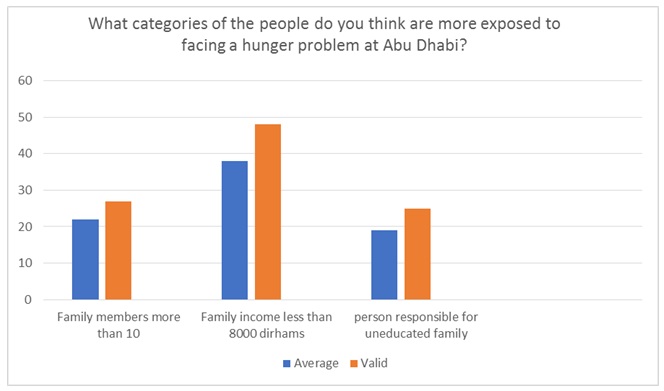
The first chart presents responses to the question concerning what categories of individuals are more likely to face the problem of hunger. The majority of respondents believe that people living in families with income less than AED8,000 are most exposed to hunger. The average result of this response is about 38%, and the valid result is about 48%. The next category defined by respondents as vulnerable is composed of families with more than ten members. The average result is 22%, and the valid result is 26%. The third place in the rating belongs to people responsible for uneducated families.
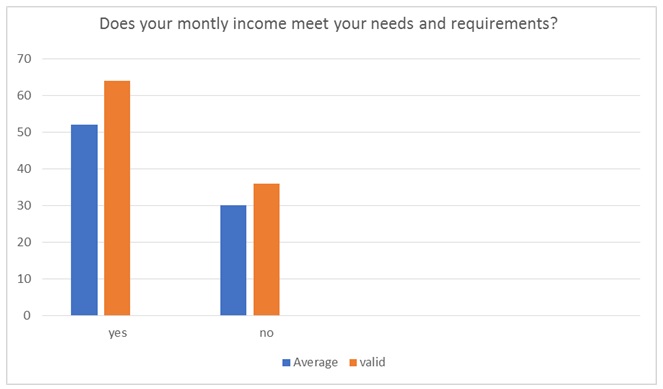
The second chart refers to people’s perception of their monthly income. Only two options were given to the participants to answer this question: ‘yes’ or ‘no.’ The majority of respondents expressed satisfaction with their monthly income, so they replied ‘yes’ to the question given. The average result of the response was 52%, and the valid result was 64%. Out of those who replied that they were not satisfied with their monthly income, the average result was 30%, and the valid result was 36%. Therefore, a considerably larger part of Abu Dhabi citizens is content with the salary they receive.
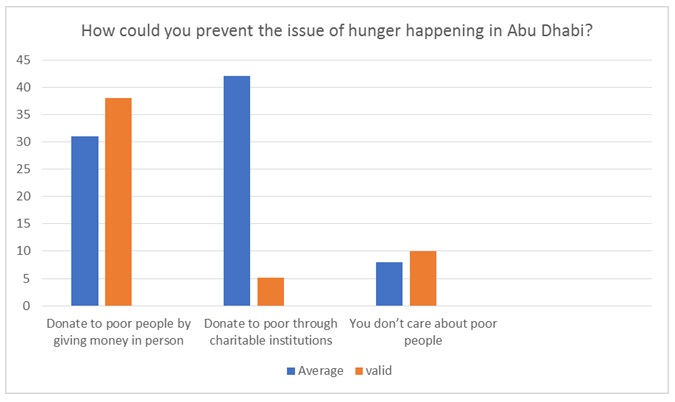
The third chart demonstrates people’s attitudes toward the prevention of hunger in Abu Dhabi. The largest average result (42%) was recorded for those ready to donate to the needy through charitable institutions. However, the valid result for the same question was only 5%. The option to donate money by giving in in person was chosen by many respondents: 35% was the valid result, and 31% was the average result. Finally, some participants said they did not care about poor people and would not help them. In that category, the average result was 8%, and the valid result was 10%.
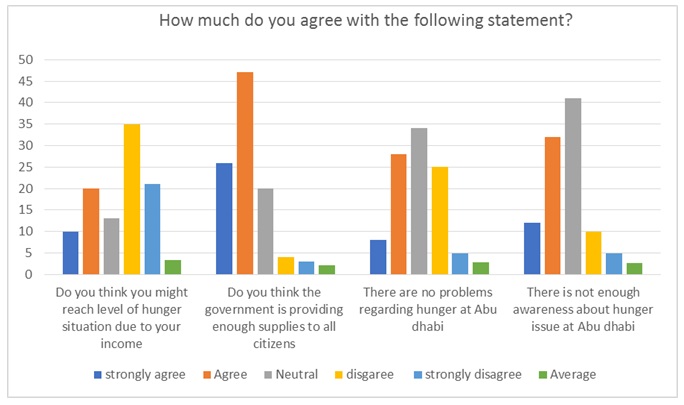
The fourth chart offers findings on how much the respondents agree with four different statements referring to the problem of hunger in Abu Dhabi. Most people believed that one’s income did not affect the disposition to hunger. Furthermore, the majority of respondents considered that the government was providing enough food to all citizens (47% agreed, and 27% strongly agreed). The answers concerning the existence of hunger problems in Abu Dhabi were almost equal in all categories, including those who agreed, disagreed, and remained neutral. Finally, many respondents admitted that there was not enough awareness of the hunger problem.
Respondents were also given an open-ended question: “What is your opinion regarding the issue of hunger in Abu Dhabi?” In this case, the answers of participants were rather different since everyone was given an opportunity to reply the way he or she wanted. It is possible to divide the most common answers into several categories. Firstly, some people said they had no opinion on the issue in question. Secondly, there were those who did not see a problem of hunger in Abu Dhabi. Their responses sounded like “I do not think that such a problem exists in Abu Dhabi,” “There is no hunger in Abu Dhabi,” “There isn’t any,” “It is not an issue,” and “Does not exist.” Thirdly, there were individuals who, either admitting or not admitting the problem, said that something should be done about it. These respondents’ answers sounded like “It needs to be solved,” “It should be talked about more,” “It’s a shame, and we need to take action,” “It is hard to live in an expensive country.” Finally, some participants suggested concrete solutions, such as giving people food or support and increasing salaries.
Discussion and Conclusions
Having obtained the results, it possible to discuss findings and make some conclusions. First of all, it is necessary to note that the results of the survey indicate the unawareness of respondents about the hunger problem in the world in general and in Abu Dhabi in particular. Although the UAE is one of the richest countries in the world with a rather high level of food safety, it is not void of problems associated with hunger. The main threat is posed by food waste, which is the result of the hospitality industry’s operations. Previous research indicates that the Abu Dhabi hospitality sector contributes to the increased amount of food waste (Pirani & Arafat, 2016). However, current research indicates that citizens are unaware of the problem or refuse to acknowledge its existence. Additionally, Szabo et al. (2018) have found that the UAE experiences a decline in food security. However, the results of the present study demonstrate that citizens do not know about these statistics and, what is more, are not much interested in learning about the situation.
Therefore, there are two problems related to the research topic: firstly, it is crucial to eliminate hunger due to the effect of food waste, and secondly, it is necessary to increase people’s awareness of the issue. As Swaminathan (2014) notes, without sufficient attention to zero hunger and food security among citizens and scholars, it will be impossible to deal with the problem. Hence, it is important for Abu Dhabi authorities to increase people’s awareness by spreading information on food waste, as well as suggesting solutions to reduce it. According to research, some steps have already been taken in this direction. Particularly, a tariff system has been developed, which charges per ton of waste generation for hospitality sector actors (Pirani & Arafat, 2016). Additionally, fines may be established for those companies that generate too much waste.
Previous research also indicates that food waste appears when spoiled leftovers are thrown away instead of being decomposed or given to animals (Bellina, 2016). Again, on the contrary to Bellina’s (2016) study, current findings indicate that people do not pay attention to their food consumption habits since they do not notice a problem. The value of the findings obtained through the survey cannot be overestimated. Society will not start taking care of the problem until it realizes that the problem exists. Hence, research shows that the first issue to deal with is the increase in people’s awareness of global and local food waste factors. Every citizen or visitor of Abu Dhabi should know about the detrimental effect of food waste, as well as about the ways of eliminating such careless disposal.
The obtained findings allow making conclusions about the study’s hypotheses. The first hypothesis was confirmed since results indicated the relationship between the level of income and the acknowledgment of the hunger problem. The second hypothesis was not confirmed since its emphasis was on the level of awareness among individuals. It was hypothesized that people under 25 would demonstrate less awareness of economic and social issues in the region. However, as it turned out, all age groups had a low level of understanding of the hunger problem. The third hypothesis was confirmed since people demonstrated the willingness to support the poor even if they did not fully comprehend the problem.
Based on the review of literature and survey results, it is viable to make several suggestions on the improvement of the situation. First of all, since most of responsibility for food waste is born by the hospitality industry, it is necessary to create guidelines for this sector to improve their functionality and reduce food waste. Secondly, it is crucial to inform the population on the problem and let them know that even though they live in one of the richest countries, they are under threat of hunger. Finally, it is important to accumulate the efforts of the public and authorities to eliminate danger and improve the level of people’s well-being at present and in the future.
References
Bellina, K. (2016). Feeding cities sustainably: The contribution of a ‘zerofoodwaste-city’ to sustainable development goal 2, ‘zero hunger.’ In I. A. S. Olsson, S. M. Araújo, & M. F. Vieira (Eds.), Food futures: Ethics, science and culture (pp. 113-118). Wageningen, the Netherlands: Wageningen Academic Publishers.
Pirani, S. I., & Arafat, H. A. (2016). Reduction of food waste generation in the hospitality industry. Journal of Cleaner Production, 132, 129–145.
Swaminathan, M. S. (2014). Zero hunger. Science, 345(6196), 491.
Szabo, S., Hossain, S., Renaud, F., Traore, D., Hussain, A., Matczak, P., … Matthews, Z. (2018). Accelerating progress toward the zero hunger goal in cross-boundary climate change hotspots. Environment: Science and Policy for Sustainable Development, 60(3), 18-27.